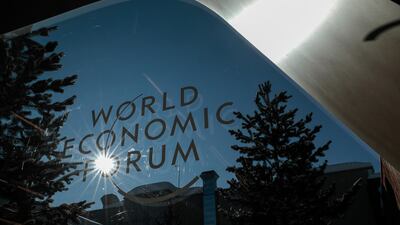Monday was relatively quiet on the main promenade of Davos, the Swiss Alps resort town where about 3,000 high-level executives and officials, and leaders of more than 50 countries, will gather this week for the World Economic Forum’s annual meeting.
There was little sign of the expected throng of vocal climate change activists apart from the message, “There is no planet B”, written crudely in huge letters in the snow on a hillside, which could be seen from the road on the way into the town.
Activists attending include Swede Greta Thunberg, 17, and the primatologist Jane Goodall.
By midday, top global chief executives began to filter into Davos and nearby Klosters, where much of the accommodation spills over.
Thousands more will come to be on the sidelines of the meeting as the retail outlets of the promenade become temporary homes from home for companies including Facebook, and governments such as Russia and Poland.
The Saudi Cafe is part of the Kingdom’s presence here.
The showpiece of the week, however, will not be Monday evening’s celebration of the meeting’s 50th anniversary or the opening discussion featuring Forum founder Prof Klaus Schwab and Ursula von der Leyen, president of the European Commission.
It will be when US President Donald Trump arrives as expected in the Congress Hall for the opening main plenary on Tuesday.
He leads a strong American delegation and trade friction with Europe is likely to be a feature of their activity during the week.
Mr Trump will make a special address to what will be a packed auditorium, with seats for media at a premium.
There was some activity within the Forum’s Congress Centre and Media Village complex on Monday, including the launch of a new "Davos Manifesto".
The forum says this “is a set of ethical principles to guide companies in the age of the Fourth Industrial Revolution”, in which technology is disrupting the way we work and live.
A Global Social Mobility report was also released, which put Nordic countries Denmark, Norway and Finland at the top of the world rankings.
“The values and structure of the Nordic system needs to be matched elsewhere in the world," said the Forum’s managing director, Saadia Zahidi.
Borge Brende, the organisation’s president and a former Norwegian foreign minister, said on Monday: "The Nordic model has another, less appreciated element: a constructive nationalism.
"This nationalism is defined not by place of origin or colour of skin, but by one’s contributions to the well-being of the community."
There was also time for the International Monetary Fund to make its customary update on the outlook for the global economy.
IMF managing director Kristalina Georgieva offered a gloomy overview for this year and said the overriding message was that growth was not certain, even if the world avoided a recession last year despite the uncertainty caused by the US-China trade war.
Now that an initial deal has been signed by the world’s two largest economies, the Forum will look on Tuesday into the words offered by Mr Trump for signs of a new round of trade conflict between Washington and European nations.
Angela Merkel is not scheduled to speak until Thursday in what could be her last appearance in Davos as German chancellor.
Mrs Merkel is set to step down next year. She has in the past few years been able to provide the argument against the rising wave of populism and nationalism.
Mr Trump is facing an impeachment trial in the Senate back home over allegations that he tried to pressure Ukraine to investigate Democratic 2020 presidential hopeful Joe Biden.
Volodymyr Zelenskiy, the President of Ukraine, gives his address on Wednesday, probably well after Mr Trump has left Davos.
Tension in the Middle East, particularly the impact on Iraq from the US-Iran escalation, is set to be an important issue during the meeting, as the Forum flagged last week.
But it is more likely that beyond the watched-for topics such as climate change or trade, something wholly unexpected will steal the limelight by the time the Forum ends on Friday afternoon.


